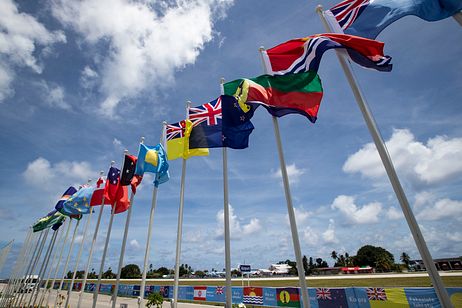Australian and New Zealand Prime Ministers Anthony Albanese and Christopher Luxon acknowledged Australia’s and New Zealand’s future success is inextricably tied to that of the region, and the Pacific is strongest when it works together.
Australia and New Zealand share a vision for a peaceful, prosperous and resilient Pacific, with the Pacific Islands Forum (PIF) at the heart of Pacific regionalism.
As fellow founding members of the PIF, they recognised Australia’s and New Zealand’s roles in contributing to a stronger PIF family and upholding common values. They recommitted Australia and New Zealand to supporting the Forum’s aspirations for the region through the 2050 Strategy for the Blue Pacific Continent and the Boe Declaration on Regional Security. Prime Ministers looked forward to shortly attending the 53rd PIF Leaders’ Meeting in Nuku’alofa, Tonga, and supporting Tonga to host a successful Forum meeting.
Prime Ministers reinforced their commitment to Pacific-led approaches to peace and security in the region, noting that Pacific countries had the will and capability to address shared security concerns from within the region. They looked forward to supporting the Pacific Policing Initiative (PPI), being developed by Pacific police chiefs through the Pacific Islands Chiefs of Police, at the upcoming PIF Leaders’ Meeting. They committed to continued support to meet Pacific policing priorities through regional and bilateral relationships, including training, equipment, infrastructure and operational deployments.
Prime Ministers also looked forward to attending the Commonwealth Heads of Government Meeting (CHOGM) 2024 in Apia in October and reaffirmed their joint commitment to working with Samoa to deliver a successful CHOGM that elevates Pacific priorities, including climate change, ocean sustainability and small state resilience.
Prime Ministers recognised that climate change is the single greatest threat to the livelihoods and wellbeing of Pacific peoples. As Pacific Leaders, they understood the shared responsibility to amplify the collective Pacific voice on climate change.
They discussed Australia’s bid to host COP31 in 2026 in partnership with the Pacific, which New Zealand supports. They agreed hosting COP31 would put Pacific voices and perspectives at the centre of global discussions on climate change.
Prime Ministers reaffirmed their support for Pacific-led initiatives to build regional resilience to the impacts of climate change and disasters. They noted Pacific priorities for more targeted climate financing solutions that respond to regional needs and would work together in multilateral fora to enhance Pacific access to climate finance. Prime Ministers noted that Australia has committed $100 million (US$66 million) to the Pacific Resilience Facility, and that New Zealand also plans to make a capital contribution once it is established. Prime Ministers reaffirmed their joint support for the Pacific-led Weather Ready Pacific Decadal Programme of Investment, to provide crucial early warning systems.
Prime Ministers welcomed New Zealand’s hosting of the South Pacific Defence Ministers’ Meeting (SPDMM) in October 2024, and noted the importance of working with SPDMM members on defence regional priorities, including creating a more connected defence network and developing the Pacific Response Group.
Prime Ministers reaffirmed Australia’s and New Zealand’s commitment to supporting the Pacific’s development priorities. Australia and New Zealand are two of the region’s largest contributors of Official Development Assistance (ODA) partnering with Pacific countries to support outcomes addressing climate change, infrastructure, education, gender equality, health, labour mobility, good governance, economic resilience and connectivity.
Prime Ministers welcomed the increased tempo of Australia and New Zealand co-financing of Pacific infrastructure and development over the past year, including with other partners. These include Tuvalu’s first undersea telecommunications cable to boost connectivity, the Tuvalu Coastal Adaptation Project to build resilience to coastal hazards, a solar power project on Buka island in the Autonomous Region of Bougainville in Papua New Guinea, the upgrade of Seghe Airfield in Solomon Islands to enhance connectivity and tourism, funding The Pacific Community (SPC) for a regional research vessel, and support for the Solomon Islands elections.
Prime Ministers recognised that the withdrawal of correspondent banking relationships (CBRs) from the Pacific presents challenges to economic resilience, growth and inclusion. They welcomed commitments made at the Pacific Banking Forum in Brisbane on 8 and 9 July 2024 by governments, banks and financial institutions, to take coordinated action to reverse this trend and to strengthen Pacific island countries’ access to the global financial system, including through the World Bank’s planned Pacific Strengthening CBRs project.
Prime Ministers were saddened by the loss of life and destruction of livelihoods and property during the recent unrest in New Caledonia. They encouraged all parties to work together constructively to shape New Caledonia’s institutional future.
Prime Ministers welcomed the decision by New Caledonia and France to invite a Forum Ministerial Committee delegation to visit New Caledonia.















